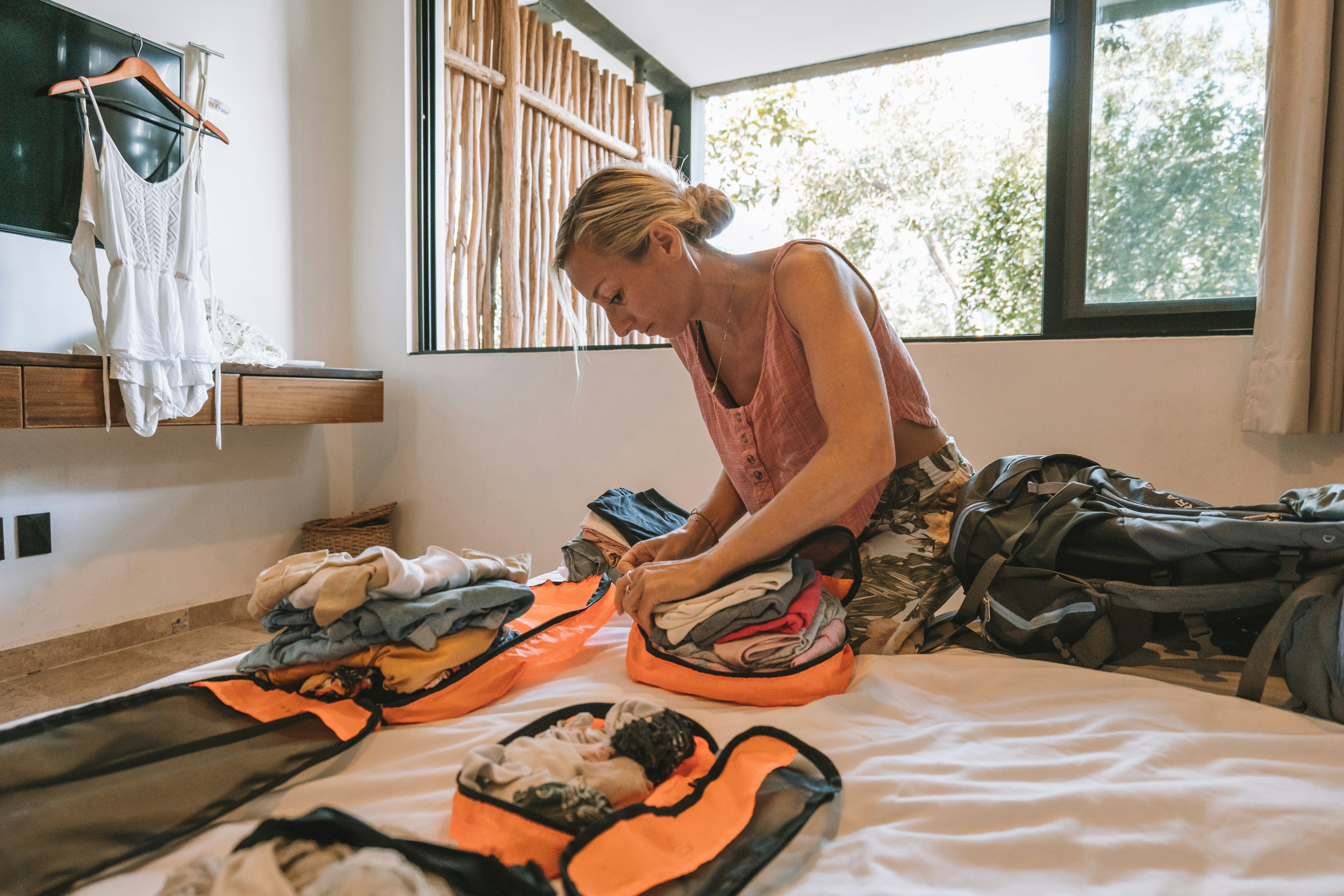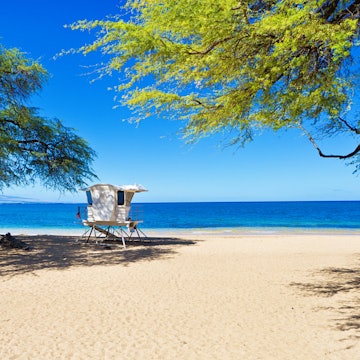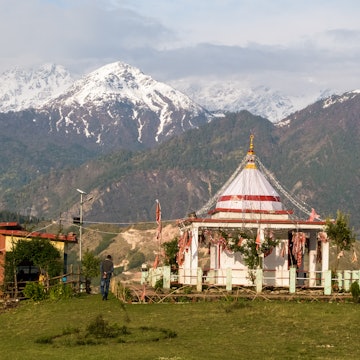

Whittle down your packing list to suit your destination. bikeriderlondon/Shutterstock
Plane tickets, check. Lodging reservations, check. After your major arrangements have been made, your bags are figuratively packed, and there’s only one thing standing between you and the world: actually packing.
For some, whittling down their wardrobe and necessities into a single bag – or a few – is one of the more confounding parts of trip preparations. But it doesn’t have to be.
First, consider your destination. If you are headed out for a specific occasion, like a backpacking trip or a music festival, you'll have different needs than a jaunt through Ireland, Spain or Italy.
Then pull up this checklist to tick off everything you need to consider before it is time to stow those bags away.

Predeparture checklist
Don’t leave home without getting the essentials in check. Here are some of the things that should be on your predeparture checklist.
Check your passport
You probably thought of this one already, but have you checked the expiration date? Some countries require passports to be valid at least six months from the date of arrival. If you have to renew, make sure you leave plenty of time, especially during peak vacation periods. Visa requirements can also change, so don’t assume the conditions are the same as your last trip if returning somewhere familiar. You can check if a visa is required at IATA Travel Centre.
Prebook and save
Booking in advance can often save you money – and that includes things like airport parking. Even if you do it on the morning of your trip, you may still save. The same is true for ordering currency in advance. When picking up prebooked currency, bring the card you ordered with and take note if you have to go to a particular point to get your cash.
Follow safety issues
Follow the news in your destination for up-to-the-minute issues that might affect your plans. National agencies like the US Bureau of Consular Affairs, Australian Department of Foreign Affairs and Trade, and UK Foreign, Commonwealth & Development Office are the best places to start.
Get insured
Travel insurance is an important part of your pretrip routine. Provisions for trip interruption, baggage delay or trip cancellation can help protect your travel investment if your trip is disrupted.
A major part of travel insurance is health insurance. Don't assume that your coverage in your home country will apply when you are traveling abroad. As for cost, expect it to increase as you approach retirement age. For the policy to be effective, every preexisting condition must be declared, otherwise your policy could be worthless and you could end up with a very large bill. Also check that any activity you’re planning on undertaking will be included in the price.
Preempt medical matters
Start with a checkup by your doctor and dentist – it’s far easier to deal with potential issues before you hit the road. Try to go as far in advance as you can, in case you need to take full courses of immunizations before you travel. You can usually get necessary vaccinations at a local health clinic, though specialist travel health clinics can also be found in major cities around the world.
Get discount and membership cards
If you’re eligible, obtaining an International Student Identity Card or International Youth Travel Card before you go will save you money all over the place. Travelers of any age will benefit from Hostelling International membership. Older travelers qualify for discounts with some airlines and with ground transportation in many countries. Sometimes flashing an ID is enough; sometimes you need to use the local method.

5 tips for packing light
Doug Dyment, author of OneBag.com, gives his advice for reducing baggage bulge.
There’s only one real secret to traveling light: a proper personal packing list. It’s a contract you make with yourself, a pledge that you will never pack anything that isn’t on your list. For most people, such a list needn’t include more items than will fit in a single carry-on bag and accommodates multiple destinations, ranging from India to Inuvik.
Learn about luggage. Most bags on the market are designed to sell easily, rather than facilitate lightweight travel. Study up on design (shapes, configurations) and construction (fabrics, zippers). You may even discover that the primary function of a wheeled bag is to support itself, not efficiently transport your belongings.
Avoid liquids; they are the bane of the light traveler. Liquids (and gels) are heavy, bulky, prone to leakage (particularly on planes) and suspicious to security. Did I mention heavy?
Plan to do some laundry. This needn’t be onerous: done properly, and regularly, it should be more like brushing your teeth. With the right gear (travel clothesline, powder detergent, universal sink stopper), three pairs of underwear will take you anywhere.
Coordinate your colors. An excellent way to derive maximum use from a modest amount of clothing is to ensure that every item goes with every other one.

Backpacker’s packing list
Ensure that nothing gets left behind with our handy checklist.
Essentials
Passport
Boarding passes
Foreign cash
Credit and ATM cards
Maps, directions and itinerary
Guidebook material
First aid kit
Travel insurance documents
Prescription and habitual over-the-counter medications
Folder for documents
Large backpack
Small combination lock
Electronics
Camera and charger
Mobile phone and charger
Tablet and charger
Headphones
Plug adapters (see below)
Flashlight and batteries
Waterproof pocket camera
Backup hard drive
Clothes
Light jacket
Waterproof coat
Light sweaters
Thin hoodie
Casual shirts
Sleeveless tops
T-shirts
Loose pants
Leggings
Shorts
Skirts
Dresses
Sandals
Flip-flops
Comfortable walking shoes
Belt
Thin socks
Underwear
Sleepwear
Sun hat or cap
Swimsuit
Sarong or shawl
Hidden zipper belt
Cosmetics
Sunscreen and after-sun lotion
Body lotion or moisturizer
Insect repellent
Deodorant
Perfume
SPF lip balm
Razor and shaving cream
Shampoo and conditioner
Soap or body wash
Toothbrush
Toothpaste
Makeup and remover
Hairbrush and comb
Hair products
Disposable wipes
Sanitary products
Nail file and clippers
Tweezers
Bug spray
Laundry kit: travel detergent, braided clothesline, sink stopper
Hand sanitizer
Dental floss
Small tubes for liquids
Tissues
Miscelleneous
Painkillers
Glasses
Contact lenses and solution
Travel journal and pen
Books
Sunglasses
Waterproof watch
Beach towel or quick-dry towel
Waterproof bag
Water-purifying bottle
Sleep sack
Earplugs
Refillable bottles
Travel neck pillow
Playing cards
Pocket sewing kit
Sleeping bag
Portable stove
Cutlery
Bowl and cup

International plug sockets
Here's a rundown of some of the world's plug sockets and fittings. Along with a converter, you can also get individual plugs. For instance, instead of using a converter to charge your iPhone, buy the country-specific plug. These are available through online retailers or in a store at your destination. You might also check with your device manufacturer. For instance, Apple sells an adapter kit that includes all world plugs.
Here's a breakdown of countries and plug types.
Australia: I
Brazil: M
Canada: A, B
China: I
Europe: C, E, F (except Switzerland and Liechtenstein, type J, which is compatible with C; Denmark, type K, which is compatible with C; Italy, type L, which is compatible with C if the socket is 10A)
Ireland: G
India: D
Japan: A, B
Malaysia: G
New Zealand: I
Singapore: G
South Africa: M
Thailand: O
UK: G
United States: A, B
This information is reprinted from Lonely Planet’s Best Ever Travel Tips.












